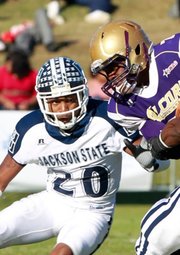Wednesday, August 28, 2013
The NCAA approved three rule changes that could cost your college football team a win this season.
In college football, the game clock stops on first downs to allow the chain crew to reset the chains. Starting this season, if a team hits a big offensive play and doesn't have three or seconds left on the clock after the official blows the play dead, the team on offense can't spike the ball to stop the clock. This is important if your team is down by one or two points late in the game.
That means a team can't spike the ball with two seconds left and try for a game-winning field goal. The only thing the offensive team can do is snap the ball and try to score a touchdown. Coaches need to have a final play handy if they don't have time for the field-goal attempt.
Another rule that could affect the outcome of a game is a 10-second runoff if the clock stopped for an injured player (only in the final minute of the first half and at the end of the game). This is to keep teams from faking injuries late in the half and at the end of the game.
The final rule change is most likely to affect teams this season. A player will be ejected, on top of a 15-yard penalty, if the officials believe that player was targeting or making contact on the head of a defenseless player.
This rule is for safety reasons. An ejected player will get the benefit of the doubt with a video review.
The 15-yard penalty is not reviewable—just the ejection. A player who is ejected in the first half will miss the second half of the game. A player ejected in the second half or overtime will be ejected for the rest of that game and the first half of his next game.
While this rule is designed to make play safer, it could potentially cause havoc three times: when teams play out of conferences to begin the season, at the start of conference play and, finally, when the bowl games start.
Teams playing out-of-conference games are subject to officials from another conference, and those officials could call games differently than the officials of their conference.
For example, Mississippi State opens the season against Oklahoma State. If the officials are from the Big-12 conference like Oklahoma State, the Bulldogs are at a disadvantage because they are not used to Big-12 officials, and vice versa for the Cowboys.
In-conference games shouldn't be affected too much because coaches will get in touch with conference officials about plays that could lead to an ejection. Playing a non-conference game and then returning to conference play, however, could cause problems.
This rule really could come into play during bowl season. Anyone who saw South Carolina's Jadeveon Clowney's hit on Michigan running back Vincent Smith in last year's Outback Bowl knows what I'm talking about. (If you haven't seen the hit, go Google it.)
ACC Coordinator of Officials Doug Rhoads said he would have called a penalty and ejected Clowney. Head of Big-12 officials Walt Anderson also said during conference media days that the Clowney hit might have been illegal.
Mike Pereira, the former NFL vice president of officiating, added his two cents, saying the hit was illegal. That doesn't mean officials from the SEC, Pac-12, Big Ten or other conferences would consider the Clowney hit illegal, though.
Video replay should help, but the penalty is so subjective that even replay might not save a player from an unfair ejection. If the penalty occurs in the second half or overtime, it could hurt a team in two different games.
Mississippi State, Ole Miss, Southern Miss and Jackson State all play big out-of-conference games. All but JSU could play in important bowl games.
A targeting penalty could prevent any of these teams from reaching a bowl game or pulling off a big win to help recruiting. Players and coaches might have to learn from experience to fully master this new rule.
I like the idea of safety, and the rule forces defensive player to tackle properly. But the NCAA should have figured out a way for officials in every conference to be consistent in every game.
